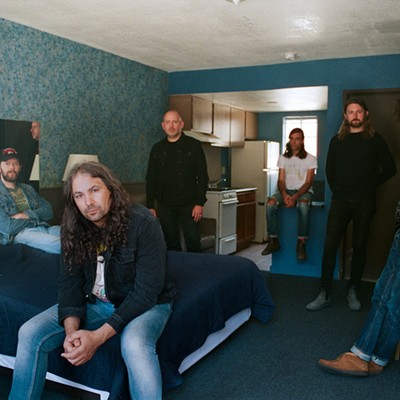When Broken Social Scene holes up in a house to write and record and album, it’s something like “The Waltons,” only more crowded, Canadian and with a pack of melodramatic musicians with whom to deal.
Bass guitarist Andrew Whiteman — who was invited to join the baroque-pop collective a year after it began touring — has been dealing with it for about 10 years and is pleasantly surprised that the enormity of the band hasn’t overwhelmed itself.
“The hardest and best part of this band is that you have to play with others; you have to get along in every way. There’s a wonderfulness to that,” he said. “Your brain melts watching them come up with these amazing ideas, and it also melts when all these people have their personal, ‘I lost my shit’ meltdowns. That can be touching and bonding and hilarious, but at the same time, it can be so fucking annoying and self-indulgent. It’s both, I guess. I’m proud that we are still talking to each other. That’s pretty good for 10 years of intense communication.”
BROKEN’S BOND
Brendon Canning and Kevin Drew formed the group in 1999, and since its inception, 26 musicians have contributed; there’s been as many as 19 active members at any one time and as few as six. Whiteman has been one of the few besides Drew and Canning to never depart, as Broken Social Scene has proven to be an impressive springboard for other acts, launching the careers of Feist, Metric, Stars, The Weakerthans and Whiteman’s other band, Apostles of Hustle.
Still, Broken Social Scene remains the most revered and beloved of all, with audiences first taking notice with its sophomore effort, “You Forgot It in People.” The eponymous junior effort broke the collective through another level as people fell in love with the lush, but caustic arrangements and sheer vastness of songs like “7/4 (Shoreline),” “Fire Eye’d Boy” and “Handjobs for the Holidays” stemming from the amount of hands going into their creation. Size is certainly a strength, with very direct results.
“We're all right with melodies, that and bombast,” Whiteman. “We're pretty good at being epic.”
Blogs and music publications fell head over heels, as have lesser — both in talent and number — acts looking to ride the band’s unreachable coattails.
“People who try to copy us, it's difficult. There's too many cooks in our band; that's the great thing about our band and the biggest problem with it,” Whiteman said. “To try and copy that, you are going to have a hell of a problem. You aren't emulating one person; you are emulating a whole mess of them.”
ASK FOR ‘FORGIVENESS’
Even the band itself seems less concerned with sounding like that; 2010’s “Forgiveness Rock Record” was noticeably more simple, linear and focused (for better or worse, depending on whom you ask). Much of it arises for a change in the group dynamic, shifting from an open-door art co-op into a more standard, cemented lineup.
“The people who play on this record ... the people who wrote this record are the same ones that have been touring for two years,” Whiteman said. “Our roster was a little more crazy the first three or four years. Things are a little more settled now, and the record isn’t as cluttered as the other records, that’s what I bring it down to. It’s a cleaner production.”
It may be some time before we see another Broken Social Scene release, although Whiteman said it should be less than the five-year gap between the last two. The group hopes to hit a host of summer festivals after this tour — including Sunday’s stop in Tulsa — before settling down for a six-month hiatus.
Undoubtedly, the collective’s parts will continue to churn out new music with the members’ respective projects in the meantime, although you can expect the slightly dysfunctional family to make its way back home soon enough to make a little magic in the way only Broken Social Scene can.
“There are these certain moments of magic between us and you just know it,” Whiteman said. “A lot of times you don’t know it, and a lot more, you think it’s magic and you find out it’s not later … but with this band, it’s unmistakable when it happens.” —Joshua Boydston










